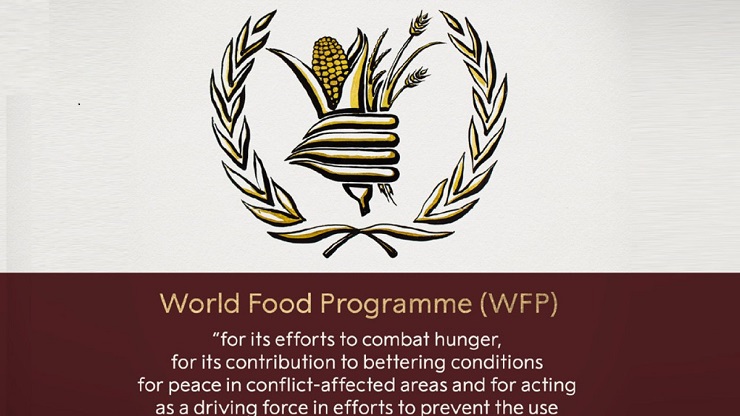Under the umbrella of the United Nations, the World Food program (WFP) is a food-assistance organization and the world’s largest humanitarian body with a focused approach to ensure food-security and counter hunger on a global scale. It had become an official body under UN in 1965. WFP was announced as the winner of the Nobel Peace Prize for the year 2020 for its efforts to provide food security and improve the chances of peace in conflict-ridden areas of the world. German Chancellor Angela Merkel congratulated the WFP when it was declared the winner of the Nobel Peace Prize for this year.
An ideational and conceptual product of US president Dwight D. Eisenhower, who proposed it as a ‘workable scheme’ in the General Assembly meeting held on September 1, 1960, WFP has Two-thirds of its work localized in the regions ridden with conflicts. It was started as a three-year experimental module by the Director of the US Food for Peace Program, George McGovern in April 1961. An initial fund of USD 100 million was provided by the US to start the WFP. Iran received wheat, sugar, and tea from the then months-old WFP, in 1962, after it was hit by an earthquake that had killed 12000 people. In Togo, WFP had established its first school-meal projects in 1963. When Sudan was affected by famine in the middle of the civil war in 1989, WFP became a part of Operation Lifeline Sudan and had dropped 1.5 million tonnes of food. This dawn to dusk air-drop by WFP in the format of 20 aircraft, three sorties a day remains to this date the largest humanitarian food-security effort. In the conflict-torn Yemen, the WFP’s efforts have been commendable. In the middle of the Yemen Civil war, the WFP had targeted to support around 13 million people and had to face operational obstructions from the local leaders who were allegedly diverting the food supply away from vulnerable people. It has also provided food support in Afghanistan in the midst of terror attacks. It had also provided humanitarian support during the Rwandan genocide (April –June 1994), the War in Kosova (1998-1999) and in the months following the Indian Ocean Tsunami of 2004.
By the end of the year 2019, it had helped 97 million people in 88 countries around the world. Last year, it had raised $ 8 billion in its funds which mainly comes from voluntary donations. Using the recent announcement as a platform, the Nobel committee gave a statement that it is a call to the international community to make sure that the WFP in not underfunded. This statement was made to hammer the idea of the hunger enunciated under the SDG into the world psyche.
The second goal under the Sustainable Development Goals 2030 is to counter global hunger, which is the primary focus of the WFP. Emergency assistance, Relief and Rehabilitation and aid for development are also provided by the WFP in the areas with conflict. The organization has its presence in India since 1963 and has provided work and support to improve the mid-day meal scheme carried out by the government. The WFP uses a network of 5600 trucks, 30 ships and around 100 planes to distribute supplies around the world at an average (estimated) cost per ration of around of about $0.61.
Secretary-General of United Nations, Antonio Guterres, as an action-based follow-up of the Nobel Prize announcement highlighted the importance of food systems and their impacts on the environment, economies, and health. He also declared the intent of the UN to transform the world food systems. This comes with the start of the World food week and will culminate in a major summit that is projected to take place next year.
The humility of the WFP is reflected in the reaction of its head, David Beasley, who hails from South Carolina, USA. He stated in his reaction to BBC Newshour that after the announcement of the Prize, he was for the first time in his life left without words. The WFP was identified to play a key role in the multilateral co-operation in shaping the food-security as an instrument of peace across the world.
The announcement of the WFP as the winner of this year’s Nobel Peace Prize comes as a clarion call in a grim global situation when due to the COVID pandemic, the world is staring at multiple famines which have the potential to push around 130 million people to the brink of starvation.





